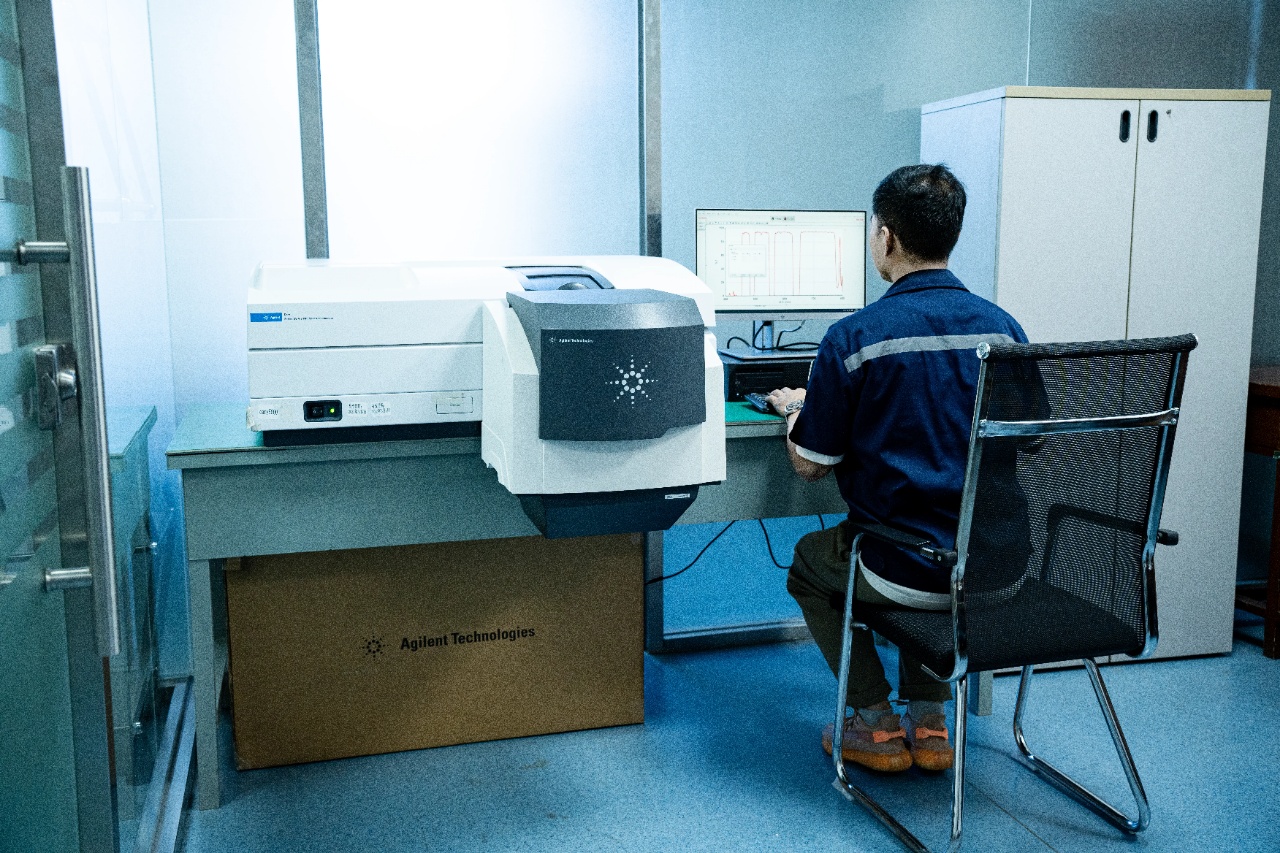Gas detection systems are super important for keeping places safe. They’re used in factories, mines, and even for checking air quality. A key part of these systems is fast-response infrared filters. These filters help spot gases quickly and accurately. Picking the right filter makes a big difference in how well the system works. Bodian, a company with tons of experience, makes awesome filters for these systems. This guide will explain why fast-response infrared filters matter, what to think about when choosing one, and how they’re used in different jobs.

What Are Infrared Filters?
Infrared filters are special parts that control light in the infrared range. They let some light pass through and block other light. This helps gas detection systems focus on the right light waves to find specific gases.
These filters make sure the system only looks at the light that a gas like methane or carbon dioxide soaks up. This makes the system more accurate. Bodian uses materials like germanium, silicon, or calcium fluoride to make these filters. Each material works best for different types of light.
Fast-Response Infrared Filters Explained
Fast-response infrared filters are made for quick action. They can change how they handle light super fast when the gas amount changes. This means the system can give you updates right away with no waiting.
In places like factories or tight spaces, quick detection is a big deal. For example, spotting methane or carbon dioxide fast can stop accidents. Bodian’s fast-response filters are built to help systems work quickly and keep people safe.
Why Speed Matters:
- Fast filters catch gas changes in seconds.
- They help warn workers before danger grows.
- They keep systems running smoothly without delays.
How Fast-Response Filters Work in Gas Detection Systems
Fast-response infrared filters make gas detection systems better in cool ways. They help the system be super sensitive and spot gases accurately.
Enhancing Sensitivity and Accuracy
These filters focus on the exact light waves a gas absorbs. This lets the system find even tiny amounts of gas. For example, they can spot methane in a factory or carbon monoxide in a small room. Bodian’s filters are great at this, helping systems give clear and fast results.
Quick filters mean the system can keep up with gas changes. This is super helpful for keeping workers safe by catching problems early.
The Role of Transmittance and Wavelength Range
Every gas soaks up light at special wavelengths. Choosing a filter that lets the right light through is key. For example:
- Methane grabs light at about 3.3 µm.
- Carbon dioxide takes light at around 4.26 µm.
Bodian makes filters that match these wavelengths. This keeps other light or gases from messing up the results. The filter’s transmittance (how much light it lets through) needs to be just right for the job.
Extra Tips on Wavelengths:
- Check the gas you want to detect to pick the right filter.
- Use a filter that blocks extra light to avoid mistakes.
- Ask Bodian for help picking the perfect wavelength range.
Factors to Consider When Choosing Fast-Response Infrared Filters
Picking the right filter can make your gas detection system awesome. Here are some things to think about to get the best one.
Spectral Range and Material Selection
The spectral range is the light wavelengths the filter lets through. Different gases need different ranges, so you have to match the filter to the gas. For example, germanium filters are great for mid-wave infrared (3-5 µm), while silicon works well for near-infrared.
Bodian offers filters made from materials like germanium, silicon, or calcium fluoride. Each one is good for different gases and systems. Pick the material that fits your gas detection needs.
Material Tips:
- Germanium is tough and great for far-range light.
- Silicon is good for mid-range light.
- Calcium fluoride works for some special gases.
- Talk to Bodian about which material is best for you.
Environmental Durability and Stability
Gas detection systems often work in tough places, like hot factories or wet outdoor spots. Your filter needs to handle these conditions without breaking. Bodian’s filters are made to last, with coatings that stop wear and tear.
Look for filters that can take heat, moisture, or bumps. Good filters stay strong even in rough weather or dusty areas. This keeps your system working well for a long time.
Durability Tips:
- Choose filters with coatings to block moisture.
- Check if the filter can handle hot or cold temps.
- Ask Bodian for filters made for tough spots.
Customization and Compatibility
Sometimes, you need a filter made just for your system. Customization means picking the exact size, wavelength, or coating you need. Bodian is great at making custom filters that fit perfectly into your gas detection gear.
Make sure the filter works with your system’s parts, like sensors or light sources. Bodian can tweak filters to match your setup, so everything runs smoothly.
Customization Ideas:
- Ask for a filter cut to a special size.
- Pick a wavelength that fits your gas perfectly.
- Get coatings to make the filter stronger.
- Contact Bodian for custom filter options.
Applications of Fast-Response Infrared Filters
Fast-response infrared filters are used in lots of important jobs. They help keep people safe and the air clean.
Industrial and Environmental Gas Monitoring
Factories, oil plants, and energy companies need to watch for gases like methane, carbon dioxide, or VOCs. These gases can be dangerous if they build up. Fast-response filters help spot them quickly, so workers stay safe. Bodian’s filters are perfect for these tough jobs.
They’re also used to check air quality in cities or far-off places. Fast filters give quick updates, so people can act fast to keep the air safe.
Industrial Examples:
- Oil refineries use filters to catch methane leaks.
- Factories check for carbon dioxide buildup.
- Environmental stations track air quality in towns.
- Bodian’s filters help in all these places.
Health and Safety in Hazardous Environments
In tight spaces like mines or tanks, gases like carbon monoxide or hydrogen sulfide can be super dangerous. Fast-response infrared filters help systems spot these gases right away. This gives workers time to get out or fix the problem.
Bodian’s filters make sure systems work fast and right, keeping people safe in risky spots.
Safety Examples:
- Miners use filters to check for toxic gases.
- Tank workers spot carbon monoxide early.
- Filters help in tight spaces with bad air.
- Bodian’s filters keep these systems reliable.
More Applications
- Medical: Check gases in hospital air or breathing tests.
- Farming: Watch for gases in greenhouses or barns.
- Cars: Test exhaust gases for cleaner engines.
- Research: Study gases in science labs.
Conclusion
Picking the right fast-response infrared filter is a big deal for gas detection systems. You need to think about the spectral range, material, toughness, and custom options. Bodian makes top-notch filters that are fast, strong, and made to fit your needs. With over 40 years of know-how, Bodian’s filters help systems spot gases quickly and keep people safe. Whether you’re in a factory, mine, or checking city air, these filters make your system work better and keep everyone safer.

Need awesome fast-response infrared filters? Contact Bodian for catalogs, prices, or custom options.
Extra Tips for Users
- Always check the gas type before picking a filter.
- Test filters in your system to make sure they fit.
- Clean filters gently to keep them working well.
- Store filters in a dry, cool place to avoid damage.
- Ask Bodian for advice on filter care.
- Check your system’s light source to match the filter.
FAQ
Q1. What is the role of infrared filters in gas detection systems?
A: Infrared filters let through special light waves that gases soak up. This helps systems focus on the right gas and be more accurate.
Q2. Why are fast-response infrared filters important in real-time gas analysis?
A: They work super fast to catch gas changes. This means systems can warn you right away about dangerous gases.
Q3. What factors should be considered when choosing an infrared filter for gas detection?
A: Think about the light range, material, how tough it is, and if you can customize it. Bodian helps make sure you get the right filter for your system.














